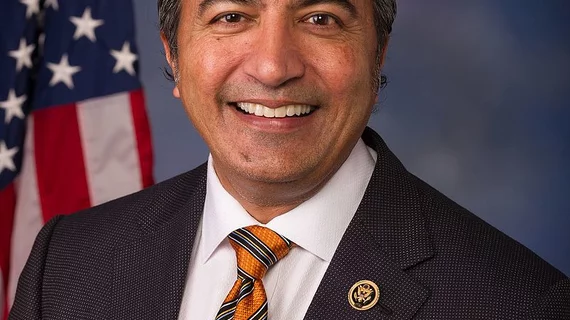California congressman proposes testing automatic enrollment in ACA plans
U.S. Rep. Ami Bera, MD, D-California, has introduced legislation that would allow states to test a version of automatic enrollment in health insurance plans while giving customers a way to opt out of coverage.
In states which choose to utilize federal grants for the pilot program created by Bera’s bill, called the “Pathway to Universal Coverage Act,” those who don’t want coverage would have to actively opt out of plans. They would have 60 days to do so under the legislation, which Bera said would ensure consumer choice is protected while also making it more likely customers sign up—particularly those who don’t realize they qualify for ACA subsidies which cover most or all of their monthly premiums.
“As a doctor, I know that health care is extremely personal,” Bera said in a press release. “Too many hardworking families have been left out or left behind by premiums and deductibles they can’t afford. Americans deserve a plan that protects their current health care coverage, expands enrollment, and reduces costs for everyone.”
Automatic enrollment in some basic level of insurance coverage has been floated by both liberal groups and Republican senators. Sens. Susan Collins, R-Maine, and Bill Cassidy, MD, R-Louisiana, proposed it for their “Patient Freedom Act” in 2017 as the coverage incentive in place of the ACA’s individual mandate. Like Bera’s plan, people would’ve been allowed to opt out of the coverage with no penalty.
Conservative groups came out firmly against the plan, and the Cassidy-Collins bill never went anywhere amid failed efforts by Republicans to repeal the ACA last year. Collins ended up being one of three Republican “no” votes against ACA repeal in the Senate while Cassidy pushed a more conservative repeal effort with Sen. Lindsey Graham, R-South Carolina, which centered on block granting much of the ACA’s funding without providing a replacement for the mandate to encourage buying coverage.
Along with the automatic enrollment bill, Bera also introduced legislation to move the ACA’s open enrollment period to align with tax season, ending on April 15. He argued ending enrollment in December has led to people avoiding the ACA exchanges because of the busy holiday season and financial stress at the end of the year.

